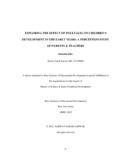| dc.contributor.advisor | Khan, Mohammad Safayet | |
| dc.contributor.author | Sarwar, Sarwat Sarah | |
| dc.date.accessioned | 2023-10-05T06:07:40Z | |
| dc.date.available | 2023-10-05T06:07:40Z | |
| dc.date.copyright | 2023 | |
| dc.date.issued | 2023-04 | |
| dc.identifier.other | ID 21355008 | |
| dc.identifier.uri | http://hdl.handle.net/10361/21642 | |
| dc.description | This thesis is submitted in partial fulfillment of the requirements for the degree of Masters of Science in Early Child Development, 2023. | en_US |
| dc.description | Cataloged from PDF version of thesis. | |
| dc.description | Includes bibliographical references (pages 65-69). | |
| dc.description.abstract | During the kindergarten stage, folktales can play a critical role in fostering children’s socio-emotional and language development as well as build children’s imagination. Folktales contain valuable morals and philosophies and foster important language skills in children. They are also deeply rooted in the community and play an integral role in shaping children’s cultural identity. In the 21st century, storytelling and folktales is becoming obscure in Bangladesh. This study was conducted to identify parents & teachers’ perceptions regarding the effect of folktales on children’s socio-emotional & language development, current storytelling practices Bangladesh, and the relevancy of folktales as cultural artefacts. Findings show that both groups believe that age-appropriate, child-friendly folktales can foster children’s moral development, social skills and language; they are also as well as important for children’s cultural identity. Findings show that folktales are disappearing in urban Dhaka due to easy access to digital entertainment for children, changing family structures and low parent-child-family interactions. To preserve the heritage of folktales, parents and teachers suggest creating a suitable environment for storytelling, increased interaction between caregivers & children for story time, suggestions to incorporate more folktales into the school curricula, and introduce folktales to children, through modern technology. | en_US |
| dc.description.statementofresponsibility | Sarwat Sarah Sarwar | |
| dc.format.extent | 79 pages | |
| dc.language.iso | en | en_US |
| dc.publisher | Brac University | en_US |
| dc.rights | BRAC University thesis reports are protected by copyright. They may be viewed from this source for any purpose, but reproduction or distribution in any format is prohibited without written permission. | |
| dc.subject | Socio-emotional & language development | en_US |
| dc.subject | Folktales | en_US |
| dc.subject | Cultural identity | en_US |
| dc.subject | Moral development | en_US |
| dc.subject | Digital age | en_US |
| dc.subject | Interaction & storytelling | en_US |
| dc.subject.lcsh | Child development | |
| dc.subject.lcsh | Parent and child | |
| dc.title | The effect of folktales on children’s development in the early years: a perception study of parents & teachers | en_US |
| dc.type | Thesis | en_US |
| dc.contributor.department | Institute of Education Development, BRAC University | |
| dc.description.degree | M. Early Child Development | |

